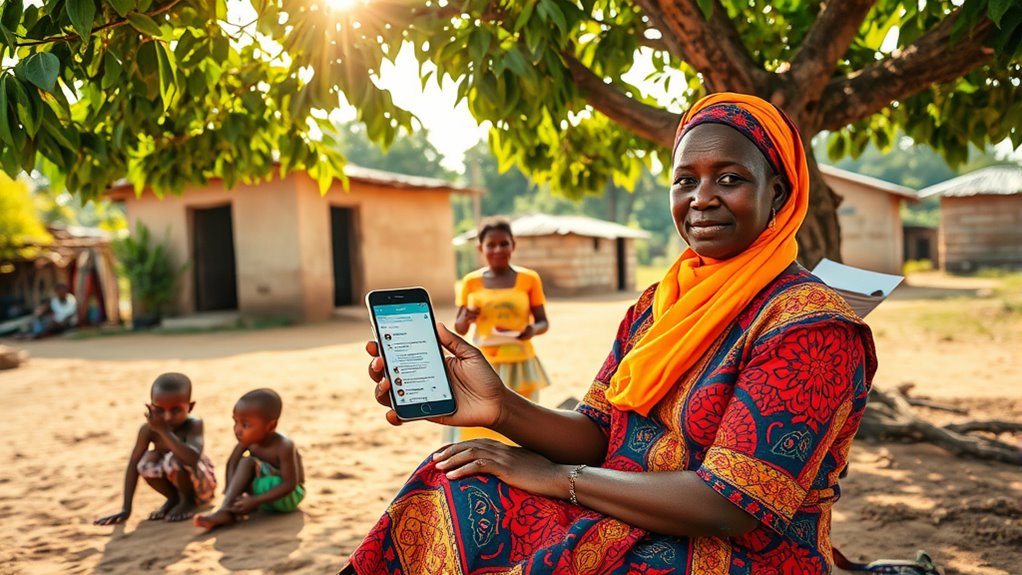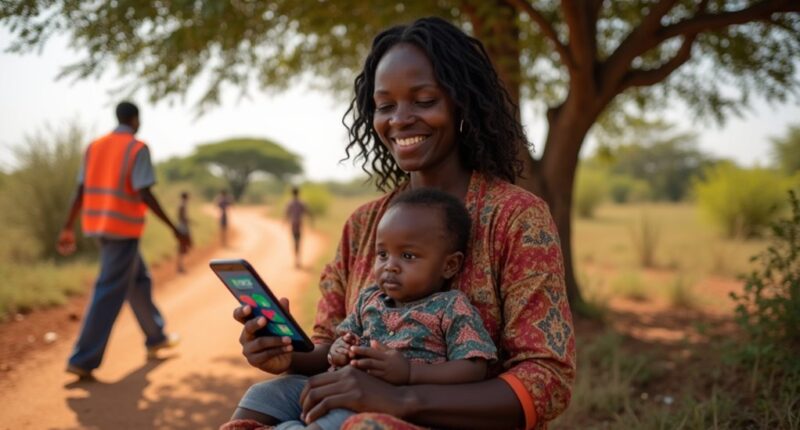Smart messaging powered by AI is transforming how you can address vaccine hesitancy among mothers in Africa. These tools provide personalized, instant responses to concerns, dispel misinformation, and build trust through engaging conversations grounded in behavioral theories. By offering culturally sensitive support via smartphones and social media, AI helps increase vaccine confidence and uptake. To discover more about how this innovative approach is making a difference, explore the details ahead.
Key Takeaways
- AI chatbots deliver personalized, evidence-based vaccine information to address mothers’ specific concerns and reduce hesitancy.
- These tools utilize motivational interviewing techniques to build trust and positively influence vaccine decisions.
- Real-time engagement via social media platforms helps counter misinformation and provides instant support to hesitant mothers.
- Automated sentiment analysis enables targeted interventions to address community-specific fears and misconceptions.
- Scalable AI solutions improve vaccine awareness and confidence, ultimately increasing immunization rates among children in Africa.

In many parts of Africa, vaccine hesitancy among mothers hampers efforts to achieve widespread immunization coverage. This hesitation often stems from distrust in vaccine safety, doubts about effectiveness, religious beliefs, and exposure to misinformation on social media. These factors create barriers to vaccination, leaving children vulnerable to preventable diseases and undermining public health goals. To address this challenge, innovative solutions are needed—one promising approach involves leveraging artificial intelligence (AI) to deliver personalized, engaging, and trustworthy information.
AI-driven interventions, especially chatbots, are emerging as effective tools to combat vaccine hesitancy. These chatbots can engage mothers in therapeutic, motivational dialogues that are tailored to their specific concerns. By combining AI with motivational interviewing techniques, these assistants offer a supportive, non-judgmental space where mothers can ask questions and receive instant, evidence-based responses. This personalized approach helps build confidence, improve health literacy, and dispel myths that fuel hesitancy. Furthermore, the mental health benefits of using supportive dialogue can enhance emotional resilience among mothers facing these challenges.
AI chatbots offer personalized, supportive conversations that boost vaccine confidence and dispel myths among hesitant mothers.
Developing these AI assistants involves creating content modules grounded in health behavior theories and validated motivational prompts. This ensures that conversations are not only informative but also psychologically impactful. Pilot tests show remarkable results: women engaging with AI-mediated chats demonstrate significant improvements in understanding vaccine benefits and safety, as well as an increase in their willingness to vaccinate their children. These digital tools are designed to be accessible via smartphones and social media platforms, making them highly scalable and ready for broader testing in randomized controlled trials.
AI chatbots excel at providing immediate, tailored responses to vaccine-related questions, which keeps hesitant mothers engaged and reassures them in real time. This instant support is essential in environments where misinformation spreads rapidly, particularly on social media. Automated social media analysis can also help identify negative sentiments early, allowing health authorities to target their interventions more effectively. Recent research confirms that social media misinformation significantly influences vaccine hesitancy, especially among mothers. Although challenges remain—such as optimizing these tools for local languages, literacy levels, and resource constraints—the potential impact is substantial.
In African contexts, where trust and accurate information are critical, AI offers a way to bridge gaps in communication. It can counteract misinformation, enhance understanding, and foster trust in vaccines, especially among mothers who are often the primary decision-makers for their children’s health. As these AI tools are refined and scaled, they hold the promise of transforming vaccine campaigns—making them more responsive, personalized, and effective at overcoming hesitancy. This approach can play a crucial role in closing immunization gaps and protecting communities from preventable diseases across the continent.
Frequently Asked Questions
How Does AI Personalize Vaccine Messages for Different Communities?
You see, AI personalizes vaccine messages by analyzing local data to understand community-specific beliefs, languages, and cultural nuances. It then tailors messages in timing, language, and framing to resonate with each group. By incorporating local metaphors and narratives, AI makes content more relatable. Additionally, it adapts messages based on real-time feedback and social media trends, ensuring that communication stays relevant and culturally sensitive to different communities.
What Are the Potential Privacy Concerns With Ai-Driven Health Messaging?
Imagine your health data being shared with third parties without your consent—this highlights a key privacy concern. With AI-driven health messaging, there’s a risk of unauthorized access to sensitive information, especially if proper controls aren’t in place. You might worry about data breaches, or your information being used for advertising. Ensuring strict access controls, transparency, and clear consent can help protect your privacy in these AI-powered systems.
How Effective Is AI Compared to Traditional Health Communication Methods?
AI can be more effective than traditional health communication methods because it offers personalized, timely messages that reach diverse populations through multilingual platforms. It adapts content to specific beliefs and environments, increasing engagement. However, AI’s effectiveness depends on addressing infrastructure challenges and ensuring cultural relevance. Traditional methods provide proven accuracy but often lack personalization and broad reach. Combining both approaches can maximize impact on vaccine uptake.
Can AI Address Cultural Beliefs Influencing Vaccine Hesitancy?
Yes, AI can effectively address cultural beliefs influencing vaccine hesitancy. You can use AI to analyze local social media and community conversations, identify specific myths, and craft messages in local languages that respect cultural norms. Chatbots and virtual assistants engage community members, answer their questions, and dispel misconceptions. Additionally, AI helps you connect with trusted religious and cultural leaders, building trust and tailoring interventions that resonate deeply with local beliefs.
What Training Is Needed for Local Health Workers to Utilize AI Tools?
You need training on how to use AI tools like chatbots and predictive analytics effectively. This includes understanding their functionalities, interpreting data insights, and applying them to targeted vaccine campaigns. You should also learn communication techniques that build trust, such as active listening and culturally sensitive messaging. Additionally, gaining digital literacy and awareness of ethical guidelines guarantees you use AI responsibly, fostering community trust and improving vaccination efforts.
Conclusion
You can see how smart messaging powered by AI is truly transforming lives, breaking down the biggest barriers to vaccination. By reaching mothers with personalized, trusted messages, you’re helping save countless lives—possibly more than you can imagine. This isn’t just a small step; it’s a giant leap toward ending vaccine hesitancy across Africa. Together, you’re part of a movement that could change the course of history—empowering mothers and protecting communities like never before.









